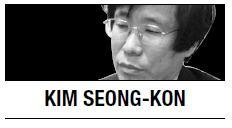When I look around, I find many extremes in our society. For example, our progressive and conservative historians confront each other as if they were archenemies. Our writers, artists and teachers, too, are divided by two mutually exclusive ideological groups. And our left-wing and right-wing politicians hopelessly antagonize each other as well. It is either friend or foe. In fact, such extremes can be found in every nook and cranny of our society these days.

A few days ago, I went to Seoul Finance Center near City Hall for a dinner meeting. Since I arrived early, I decided to take a walk to nearby stores for window shopping to kill time. Walking in the heart of the city, suddenly I noticed I was standing amid a great flood of English signs. To my right, there were Starbucks Coffee, Kukje Hotel and New Seoul Hotel, and on my left side were Angels-in-Us Coffee, Pizza & Pasta, and Texas: Western Ice Bar. Ahead of me, I could see The Exchange Seoul, JoyKolon and Mango, Coffee & Dessert, all of which were written in English only.
When I was in Koreatown in Los Angeles a few years ago, I was embarrassed to find that many Korean stores’ signboards were written in Korean only, or with almost indiscernible, tiny English store names beneath big Korean names. “Come on. This is America,” I said to myself at that time. “You should put up an English sign, or at least a Korean/English sign with equal size of letters.” Now back in Seoul, I was equally embarrassed to find the opposite phenomenon; English store signs on Korean soil virtually everywhere, without Korean names on them.
These two contrasting phenomena indicate the undesirable Korean tendency to push everything to the extreme and be strongly inclined to the mutually exclusive “either/or” mentality rather than to the inclusive, harmonizing “both/and” psychology. Indeed, instead of embracing both and maintaining the balance and harmony, we always like to choose one of the two and antagonize or eliminate the other.
The other day, I was appalled to read newspaper columns and editorials which asserted that our imminent task is to choose one between China and the United States as an ally. One column maintains that since China is rising and America is losing her power in Asia, we should choose China as our new ally. The other argued that we should continue to have the States as our ally because China still has far to go to become a truly advanced country and meanwhile, America will continue to exert influence on Asia.
You do not have to be a professional diplomat to know that we cannot simply choose one of the two countries as our ally and terminate our relationship with the other. It is Diplomacy 101 and all you need is common sense to know that. Alas, even our opinion leaders seem to seriously lack common sense and as a result, they urge us to choose one and eliminate the other even in diplomacy. In that sense, our next president should be a skillful diplomat who can maneuver smoothly between China and the United States, and between China and Japan. Perhaps that is the only way not only to survive but also thrive in this peninsula mapped in like a bridge between aggressive, powerful countries. Of course, we should constantly be alert to our trigger-happy neighbor, North Korea, as well.
Last week, I delivered a lecture entitled “From Diaspora to Trans-nationalism” at an international conference held in Seoul. In my talk, I argued that since time has changed, Korean-American literature should now move from the theme of diasporic experience (identity crisis, loyalty conflict, assimilation, and racial discrimination) to a new realm of trans-nationalism (multiple identities, and loyalty to both homeland and host country). I pointed out that for the past few decades, Korean-American writers have struggled with the problems of first-generation immigrants such as language barriers, nostalgia, or acculturation. I maintained that from now on, however, Korean-American writers should also explore the other realm of immigrant literature in light of trans-nationalism which embraces cultural cross-over and allows loyalty to both countries; according to trans-nationalism, immigrants no longer have to choose between their home country and host country or assume only one cultural identity.
However, my discussant, who was a professor of Korean literature, was skeptical. Confused, he asked me, “How could you not choose one?” Then he added, “How could you have more than one identity? And how is it possible that you are loyal to two countries at the same time? Is trans-nationalism not a conspiracy of the West to colonize Korea?” Perhaps because my direct approach caused him much anxiety; he seemed to be extremely confused and worried about the uncertainty I try to present as part of our living conditions today.
Traditionally, Koreans tend to be reluctant to cross boundaries and merge with others. Nevertheless, we should learn to embrace others, avoid extremes and expand the scope of our myopic visions in this age of transnationalism.
By Kim Seong-kon
Kim Seong-kon is a professor of English at Seoul National University and president of the Literature Translation Institute of Korea. ― Ed.








